MercoPress. South Atlantic News Agency
Brazil
-
Monday, November 2nd 2015 - 08:43 UTC
Brazilian central bank opposes using the country's US$ 370bn reserves
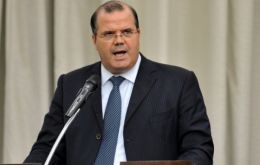
Brazil's central bank chief, Alexandre Tombini, told lawmakers he opposes using the country's $370 billion foreign reserves at this moment as they serve as an insurance policy for Latin America's largest economy.
-
Monday, November 2nd 2015 - 08:26 UTC
Lula urges ruling party to support austerity measures and minister Levy
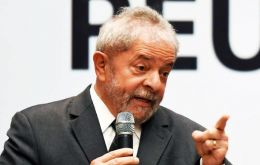
Former Brazilian president Lula da Silva urged the ruling Workers' Party to back fiscal austerity measures in Congress, endorsing the efforts of Finance Minister Joaquim Levy to plug a gaping deficit. Members of Lula's party have opposed moves by Lula's protégée, President Dilma Rousseff, to cut public spending and social benefits as she strives to balance overdrawn accounts and restore investor confidence in Brazil.
-
Saturday, October 31st 2015 - 09:40 UTC
UK and Brazil committed to exchange of EU/Mercosur market access offers by end of 2015
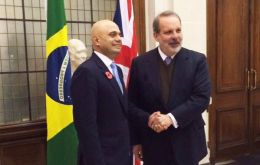
The United Kingdom and Brazil reaffirmed on Friday their support for the success of the European Union/Mercosur Association agreement negotiations in the framework of the eighth meeting of the UK-Brazil Joint Economic and Trade Committee (JETCO) which emphasizes bilateral cooperation and initiatives.
-
Saturday, October 31st 2015 - 06:42 UTC
Unemployment in recession-hit Brazil climbing: 8.8 million looking for jobs
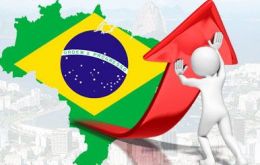
Unemployment in recession deep Brazil climbed to 8.7% of active population in the quarter ending last August, the government said Thursday. The indicator shows a steep hike from the 6.9% recorded in August 2014, according to statistics of the National Study of Households (PNAD), published by the state Brazilian Institute for Geography and Statistics (IBGE).
-
Thursday, October 29th 2015 - 06:53 UTC
On Amazon Day, Minister Swire praises Brazil as champion on climate change and tackling deforestation

Describing Brazil as a valued partner of Britain, and champion on climate change and tackling deforestation, Minister of State for Latin America, Hugo Swire, attended on Wednesday the Amazon Day 2015 at the Brazilian embassy where he also met with ministers Texeira, Levy and Coutinho who are in London for the first UK-Brazil economic and financial dialogue round.
-
Tuesday, October 27th 2015 - 07:43 UTC
Japanese company acquires part of Petrobras gas distribution unit

Japan-based Mitsui has signed an agreement with Petrobras for partial acquisition of shares in the latter's natural gas distribution unit Petrobras Gás (Gaspetro) for about R$1.9bn ($489m).
-
Tuesday, October 27th 2015 - 07:30 UTC
Son of Lula da Silva's offices raided as part of investigation into tax fraud

Brazilian police on Monday raided the offices of a company belonging to a son of former president Lula da Silva as part of an investigation into tax fraud. The raid was part of a broader operation involving about 100 agents who descended on offices in the cities of Sao Paulo, Piaui and Maranho armed with arrest warrants and orders to seize documents and accounting records.
-
Friday, October 23rd 2015 - 08:30 UTC
Rousseff admits massive budget deficit this year; estimates are of 9% of GDP
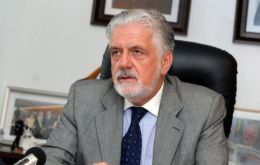
Brazil has given up on its goal of seeking a primary budget surplus this year and instead will record a massive shortfall as a deepening economic and political crisis drags on revenues, presidential chief of staff Jaques Wagner said on Thursday. Brazil's overall budget deficit has soared to 9% of GDP, according to estimates.
-
Friday, October 23rd 2015 - 08:22 UTC
Dutch company and Brazil negotiating a $250m Petrobras bribery settlement

Brazil told Dutch SBM Offshore NV, the world's top oil production ship leaser, to agree soon to a $250 million bribery settlement if it wants to regain its biggest client in the world's largest oil-ship market, according to media reports from Brasilia and Sao Paulo.
-
Thursday, October 22nd 2015 - 07:26 UTC
Brazil's opposition files new impeachment petition against Rousseff
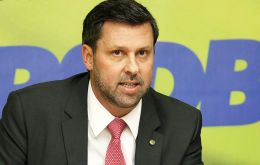
Brazil's opposition filed a new impeachment petition against President Dilma Rousseff on Wednesday, accusing her of illegal accounting practices. The much-anticipated petition, whose authors include a founder of Rousseff's Workers' Party, was handed over to congressional lower house speaker Eduardo Cunha.
